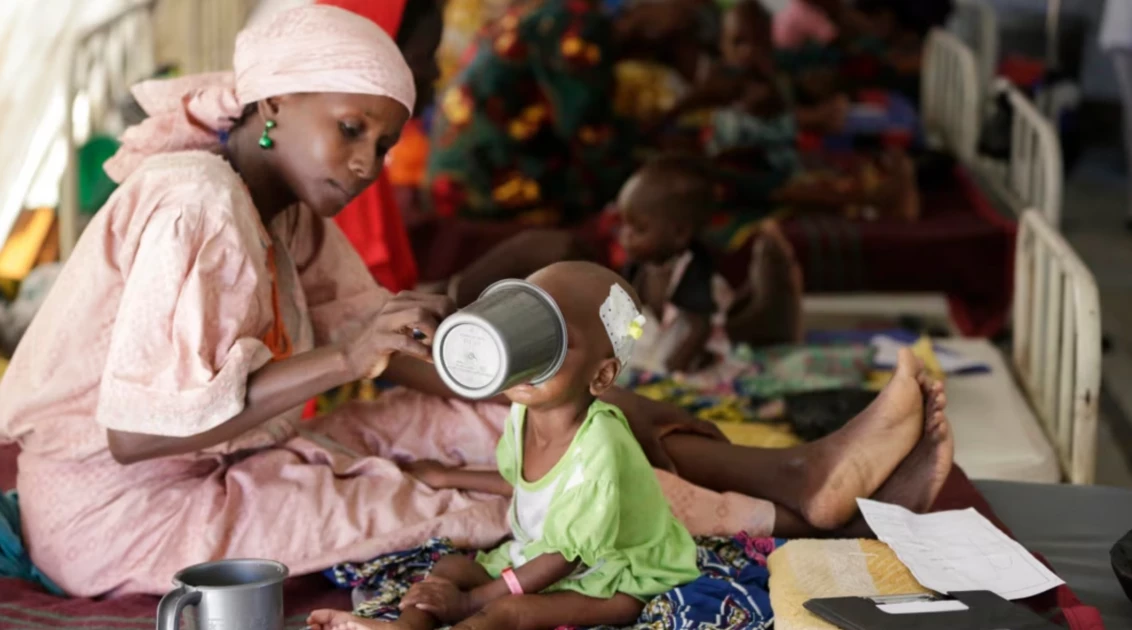A growing humanitarian crisis is unfolding in northeastern Nigeria, where a surge in jihadist attacks, withdrawal of international aid and worsening economic conditions are pushing over a million people towards starvation.
In towns like Damboa, once known for their thriving farms, families now queue for dwindling food supplies, while those who fled attacks return to find their villages overtaken and their farms abandoned.
Damboa, located near the Sambisa forest in Borno State, now sits at the centre of this crisis. The forest has become a base for armed groups that have regained strength this year, straining Nigeria’s security forces already stretched thin by conflicts and economic instability elsewhere.
In May, Almata Modu fled her village after militants overran it. Now in Damboa, she lines up at an aid distribution centre, worried that food stocks may not last. “We are safe, but the food is not enough,” she said.
Like Modu, thousands have moved into urban areas, escaping the countryside where armed groups have made farming nearly impossible.
Aminata Adamu, displaced for ten years, says she now feeds 11 people with food rations meant for four. But these rations too will disappear by the end of July, as donor support collapses.
Aid groups say funding cuts, including those linked to former US President Donald Trump’s dismantling of the USAID programme, have triggered a breakdown in critical operations.
“This is our last rice from USAID,” said Chi Lael, the World Food Programme’s spokesperson in Nigeria, while pointing to emptying stores in Mafa, about 150 kilometres from Damboa. WFP says there are five million people facing severe hunger in the states of Borno, Yobe and Adamawa — but it currently supports only 1.3 million. With no more food left in warehouses, Lael warned, “Lives will be lost.”
The crisis has deepened at the worst possible time. The current period between planting and harvest, known as the lean season, means most families have little to no food.
And with inflation soaring, many can’t afford to buy what little is available. “They can't afford much,” said Diana Japaridze from the International Committee of the Red Cross. Fields that once fed entire communities now lie empty or overgrown.
Farming under such conditions is dangerous. Residents say a farmer was recently killed while working in his field. Others tend their crops only under the watch of armed militias stationed along key roads like the Maiduguri-Mafa highway.
The group known as ISWAP, which broke off from Boko Haram, is now more organised and continues to pose a serious threat. Regional counter-terrorism efforts have also weakened, with the Nigerian military facing multiple internal security challenges and limited resources.
Meanwhile, the most vulnerable — especially children — are bearing the brunt. According to Kevin Akwawa, a doctor with the International Medical Corps, Damboa now records the highest rate of child malnutrition in northeastern Nigeria.
Fanna Abdulraman, a mother of eight, brought her severely underweight twins to a nutrition centre but could not breastfeed them because she is malnourished herself.
At least 150 of the 500 nutrition centres supported by WFP are expected to shut down this month.
Dr John Ala, a WFP nutrition officer, said this would leave about 300,000 children without life-saving treatment. Despite USAID banners still hanging outside these centres, security checks and long queues offer a grim reminder of how dire the situation has become.
“If food insecurity and poverty continue unchecked, more insecurity will follow,” warned Ala. He fears people will be forced to adopt extreme measures to survive. WFP’s Nigeria chief David Stevenson added that with nearly 31 million people facing hunger across the country, “this is no longer just a humanitarian crisis, it's a growing threat to regional stability.”
Many affected families are unaware that food and health support is about to end. “I can't imagine that we will live,” said Fanna Mohammed, a mother of nine, with her young children clinging to her as she absorbed the news.
A joint outlook from the WFP and Food and Agriculture Organization covering June to September warns that food insecurity will deepen in the coming months.
Conflict, flooding, and the worsening economy will continue to push families into desperation — while those still trying to farm do so under the threat of violence and with little support left.

